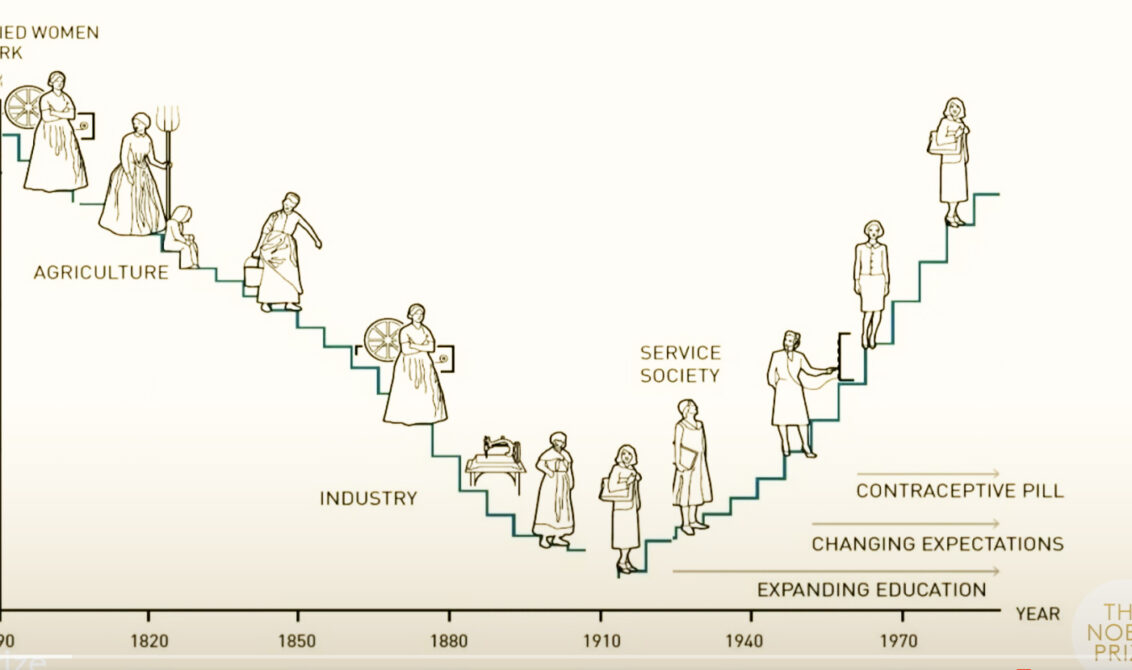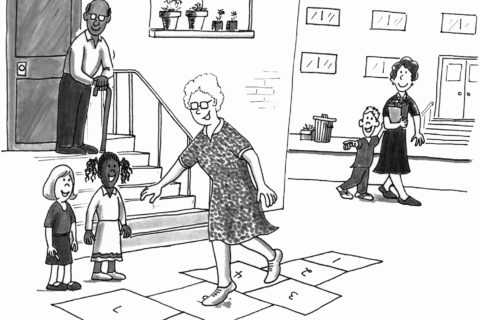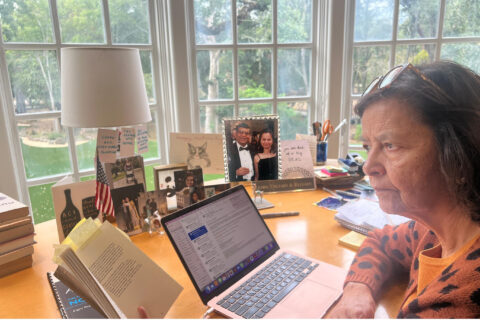
In the judiciary, two torch-bearers of women’s equality were Justice Sandra Day O’Connor, the first woman to be appointed to the Supreme Court, who passed away on Dec. 1, 2023, and Justice Ruth Bader Ginsburg, the second.
Linda Hirshman, author of Sisters In Law, wrote, “Justices [Ruth Bader] Ginsburg and O’Connor .. together delivered the Supreme Court decision to ‘admit women in Virginia Military Institute ‘opening doors for women in uniform’. .. The Constitution demanded.. equal protection under the laws for all..” In her book, Hirshman states, “One small victory at a time, one case at a time.. sometimes they lost some of their previous gains. Progress in women’s equality is not a linear movement forward.”
So true!
Before them and since, women fought for equality and a voice.
Claudia Goldin of Harvard University’s 2023 Nobel Prize for Economics, drives the point of women’s equity home, based on market data. Introducing Claudia Goldin during the award ceremony, Kerstin Enflo of Lund University said, “It’s about time!”
The Nobel Academy stated, “Claudia Goldin’s research has given us new and often surprising insights into women’s historical and contemporary roles in the labor market.”
Her evidence-based research documents the historical shift of goods produced at home, to industrialization, and then to the service industry and why women entered or exited from economic activities as a result.
Goldin’s academic work is appealing, and written in everyday language:
“Women are on-call at home, and men on-call at work.”
- “In that process, the couple’s equity gets thrown under the table,” she said. Men cannot spend much time with family, and college-educated women back off from intense “greedy jobs” (high-paying), when they become caregivers of kids.
- The inequality cannot be entirely explained due to biases and discrimination — although they factor in. Most wage gaps are due to the choices women make. The choice of profession, the choice of when to marry, the choice of if and when to have kids, and how many hours a week to work. Men do not have to make these choices. They can have kids and careers at the same time.
- In her 2021 article, Goldin wrote “What Accounts for the Gender Equality Among Pharmacists?” This high-paying profession has become highly egalitarian in terms of pay. Pharmacists’ salaries have gone up substantially, because of the requirement of six years of college education. In addition to filling and dispensing prescriptions, pharmacists are now expected to advise patients on the use of prescription and over-the-counter drugs, administer vaccinations, and give general home care advice.
- Equality in pay for pharmacists, explains Goldin, is due to “the substitution factor,” when other pharmacists fill in for each other during extended hours. The same happens in traditional teaching jobs, which also attract women.
In my case, I wanted to have both a career and kids. I was 38 when my first daughter was born and 42 when I had my second. At the same time, my husband and I had two startups, It was a struggle.
Looking back, I see that I had the privilege of being able to call my own shots. I was also able to set my own priorities each week even though I was on call both at home and at work.
Luckily since our startups were better established — both my husband and I had started taking salaries — we could afford quality childcare. However, we had no savings and could not build reserves for a long time.
Last but not the least was hiring and managing a full staff at home. We needed to keep the household machinery running smoothly so that I could focus on my startup. We hired a property manager who then hired a house cleaner and a gardener. I also decided to get a chef to provide our palates with Indian food, and a high-quality nanny. It was my job to hire, fire, compensate fairly, and retain the people that my family and I depended on. They tolerated my idiosyncrasies, as much as I did theirs. We made compromises.
But then my father was diagnosed with Parkinson’s. My sisters who lived nearby pitched in. But it was a painful decision to move him to an assisted living facility. In my culture, aging parents who can no longer live independently move in with their children. Every day on my drive back from work, it would pain me if I did not take the Foothill Expressway exit just to spend half an hour cheering Dad up, while my daughters waited eagerly for me to get home.
I remembered my father when Claudia Goldin accepted her award, saying, “Women have to make choices when they are the caregivers of kids and/or of elderly.”
Today “women are at the center of the economy. More than 50% of college students in the US are women, and they also control the fertility rate of a country.”
Prof. Goldin’s work is logical, compelling, and convincing. It will influence our future policies, even if it means two steps forward and one step back.








Valerie Baldwin
This meshes well with today’s NYT Business section article "What Social Trends Taught Us". showing how women have rebounded from Covid with more jobs after Covid than men have. Interesting.
SREEDHAR MENON
This is not a specific area of interest to me! I found this too long compared to other crisp and sharp articles of VINITA GUPTA!
Vijay Gupta
As the former CEO of PepsiCo, Indra Nooyi said, "The biological clock and the career clock are in conflict. Some women are delaying childbirth for many, many years." However, delaying the children does not really resolve this fundamental conflict. The adverse career impact of having children can be just as bad at 38 as at 28 (or worse).
Moreover, most working women cannot afford to hire enough help (nanny, cook, etc.) to raise kids. So the end result is that birth rates among career women are falling sharply everywhere.
Finally, motherhood (or fatherhood) gets no respect in the money and career-oriented US culture. Parents get no social recognition/status for raising good citizens, but plenty of criticism for any failures.
vinitagupta
Agreed, Vijay. Thanks for your insightful observations.
Although India has the lowest percentage of college educated women earning income. Not sure if it is culture, in general.
Sandip Bose Mullick
Well articulated Vinita. While I am certainly not a woman Basher but 50% full time working women in the WEST is perhaps also one of the reasons for significant drop in birth rates which at present is below 1.2 per couple when the minimum requirement is 2+ per couple to maintain same population. See what is happening to China after their disastrous ONE child policy for last 30 years, the real impact of which will be felt by the whole country in next 2 decades.
I am all for women’s emancipation but how and where one should draw a line. Point to ponder
Prasad Vepa
Thank you Vinita, for sharing your experience and insights through this thought-provoking article. As you pointed out, clearly, women face the conflicts and tradeoffs between career and family more sharply and with greater consequences than men. They have also become better jugglers than men because they have been historically doing it for longer and have become more skilled at it. Your success has come from courageous decisions and sacrifices in the face of challenging choices. The time has come for us as a society to shift our fundamental bias in priorities from career, power and economics to humanity, compassion and empathy if we are to evolve from struggling and surviving to thriving and being happier as we try to shape a brighter future and a better planet for our children and future generations.